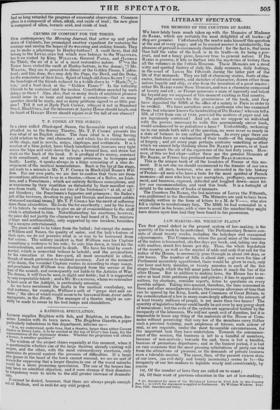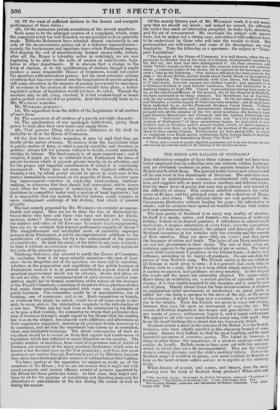LAW-MAKING—MR. WICKENS' PLANS.*
tHE first grand defect in the present system of law-making, is the quantity of the work to be performed. The Parliamentary Session consists of about twenty weeks, including the holydays and occasional adjournments. The Commons, where the great mass of the business of the nation is transacted, sits five days per week, and, taking one day with another, about five hours per day. Thus, the whole legislation of the country, as well as the myriad of odds and ends that call for the notice of the House, is necessarily gone through in about 100 days, or 500 hours. The number of bills is about 300; and were the time of Parliament accurately apportioned, there would be given to each, only one hour and forty minutes, or twenty minutes to each of the five stages through which the bill must pass before it reach the bar of the other House. But in addition to making laws, the House has to receive at least 3000 petitions public and private ; it has to appoint committees, try elections, consider reports, listen to questions on every possible subject. Taking into account, therefore, the time consumed in these and other miscellaneous duties, the average allowance of time that can be spared by the King, Lords, and Commons of Great Britain, to the consideration of a law in many cases deeply affecting the interests of at least twenty millions of people, is not more than two hours ! The quantity of legislative labour could hardly be got over by any peony short of miraculous ; but the evils of the system are aggravated tenfold by the incapacity of the labourers. We will not speak evil of dignities, but it is impossible to know any thing of the materials of the House of Commons without perceiving that very few of the members carry thither such a previous training, such ampleness of leisure, such ardour of zeal, as are requisite, under the most favourable circumstances, for the important task they have undertaken. Towards the commencement of the session, the business is left to a handful of members, because of non-arrivals ; towards the end, there is but a handful, because of premature departures ; and in the busiest period, it is but on rare occasions that the most pressing solicitations of party can win from the attractions of pleasure, or the demands of private business even a tolerable muster. The cause, then, of the present vicions state of our laws, (an evil daily and hourly increasing) seems to he—the incapacity of our law-makers to legislate wisely and considerately, by reason 1st, Of the number of laws they are called on to enact ; 2d, Of their want of previous education in the art of law-making ; * An Argument for more of the Division of Lebow. In Civil Life in this Country Part I.; in which the Argument is applied to Parliament. By William Wickens. London, 1829. Saunders and Utley.
3d, Of the want of sufficient motives to the honest and energetic performance of these duties ; 4th, Of the numerous private avocations of the several members. Such seem to be the principal sources of a complaint, which, since the complaint is but too well-founded, we are gratified to hear generally made. Hitherto Reformers have attended almost exclusively to one only of the inconveniences arising out of a defective representation— namely, the burdensome and improper taxes which Parliament impose. Not denying the evil of mischievously framed money-bills, (which, after all, the House is tolerably active in watching), we are now beginning to be alive to the evils of useless or mischievous legislation in other departments. It is obvious that a change in the form of election, or in the qualifications of electors, though it might Produce a more responsible House of Commons, would not endow the members with miraculous powers. Let the most extensive scheme of reform that has ever entered into the imagination of man be adopted, still some alteration in the manner of passing laws would be necessaiy. If no reform in the election of members should take place, a betterregulated system of legislation would yet have its value. Though the machine may be old, crazy, cracked, it is but wisdom toget as much and as perfect work out of it as possible. And this naturally leads us to Mr. WICKENS' remedies.
MY. WICKENS proposes
1st, The separation from the duties of the Legislature of all matters (If mere form.
2d, The separation of all matters of a purely scientific character. 3d, The amelioration of our municipal institutions, giving them power to look after their own wants and supply them.
4th, That persons filling other active situations in life shall be ineligible to sit in the House of Commons.
Of the first two of these remedies, it may be said that they are hardly of the nature of cures. To remove from the Legislature what is purely matter of form, or what is purely scientific, and therefore in practice always left for persons without to decide, cannot materially abridge its labour. The third remedy is of more importance ; and if adopted,. it might go far to withdraw from Parliament the mass of private business which at present presses heavily on its attention, and for the proper and impartial consideration of which it is notoriously incompetent. There does not seem to be the slightest difficulty in framing a law by which power should be given in •every case to the parties immediatelyconcerned, or the majority of them, to enter upon any improvement—whether in enclosing, road-making, harbourmaking, or otherwise that they should find convenient, and to assess each other for the purpose of completing it. Some wrong might doubtless be committed under such a system of local legislation ; but it is impossible that any system, however vicious, could surpass, in open, undisguised contempt of fair dealing, that which at present . prevails.
The last remedy proposed by Mr. WICKENS we consider as impracticable and unjust. How are we to draw the line of distinction beiweeu those who have and those who have not leisure for Parliamentary duties ? Granting that we could ascertain with accuracy the number and value of Sir EDWARD F.InGDEN's legal engagements, how are we to estimate that learned gentleman's capacity of labour ? The straightforward and intelligible mode of excluding improper persons from Parliament, is not by. incomprehensible additions to the qualification of candidates, but by a due enlargement of the powers of constituents. To limit the choice of the latter in any case, is unjust ; to limit it without an extension of the franchise, would only aggravate the evils, of the present system. Thinking, therefore, any attempt to purify the House of Commons, by excluding from it its most valuable members—the men of business—to be altogether out of the question, we have still to ascertain, whether, in the preparation and expediting of the public business of Parliament, even as it is at present constituted, a great deal of real practical improvement might not be effixted. In the first place, we do not see why, in the commencement of each session, various committees might not be formed, something of the nature of the bureaux of the French Chambers, consisting of members whose previous studies had made them specially acquainted with some one department of public business. One committee might be of manufactures, one of banking, one of commerce, and so on. Such committees or boards, or whatever they might be called, would be at all times ready to furnish, to every seeker, the information requisite to the introduction of a new law. When any law had been so far sanctioned by the House as to pass a first reading, the committee to whom that particular division of business belonged, might report to the House what the existing law was on the subject, recommend such additions and alterations as their experience suggested, including all practical details necessary to its execution, and see that the enactment was drawn up in consistent, clear, and intelligible language. The direct consequence of such an expedient would be to rescue us from that caprice and carelessness of legislation which has inflicted so much litigation on the country. The greater number of members, from want of experience and of habits of business, are ignorant of the many practical hindrances which arise to thwart a law founded even on the best principles ; and thus, few great measures are carried through Parliament except by Ministers, because they alone have funds and all the sources of information at their bidding. We have spoken of the apparatus we suggest as made up of the members of the House ; but we are not certain that it might not with equal propriety and greater efficacy consist of persons appointed by the House for those particular duties. In that case, they might continue to sit for the purpose of considering and digesting proposals for alterations or amendments in the law String the recess as well as during the session. Of the merely literary part of Mr. WICKENS' work, it is not necessary that we should say much ; and indeed we cannot, for although the writer has made an interesting pamphlet, he lacks style, clearneSs, and the art of arrangement. He overloads his subject with minute facts, but he makes out a strong case, and states it with sufficient force to be understood by those who will take the trouble to think. His personalities are well-aimed ; and some of his descriptions are very laughable. Take the following as a specimen : the subject is " Trumpery Legislation."
"The Speaker of the House of Commons, it is well known, when the op-. portunity is afforded him at the close of a Session, triumphantly recounts to his Mai-Ay, the feats that have distinguished it. On these occasions, and while vittters remain as they now are, this eminent individual will certainly never x;) common justice to his theme, till he appends to his harangue, some such 1...cital as the following : 'Our anxious attention has been given to the state o: the River Ribble, and the Roads about Paddle Brook we have directed to be repaired. The communications with Cow Down, Pot Hook's End, ar 3al1y-hooly, have not escaped our vigilant regards ; and, agreeably t a wriitimous decision of your faithful Commons, there will henceforth be a hallway leading to Bulb o Pill. Urgent representations having been made to us, of the objectionableness of the present site of the Hospital at Sheffield, we have consented to its being changed. The Workhouse too at Norwich, will, by our authority, speedily be taken down. To the townships of Skipton and Sharples, a further supply of Water has been awarded ; and fit spots have been indicated by us, for the Plymouth Hackney Coach Stands. Nothing deterred by the difficulties and entanglements attendant thereon, we have plunged into all the minutim of the two great questions—the having a tram road between Manchester and Liverpool, and the lighting Edinburgh with Oil Gas. " Delivered," as we ultimately were, and " in a way suited to the wisdom of Parliament," of these momentous topics, we proceeded to vest Pedlar's Acre in Trustees, and to remove doubts, which, we flatter ourselves we have for ever done, as to the legality of the erection of the portico of St Mary-le-bone parish Church. Furthermore we have passed Bills, to Which we supplicate your Royal assent, authorising Kitty Jenkyn Packe to bear the arms of Reading and naturalizing Henry Van Wart !' "*
* These, and a crowd of equally dignified enactments, are to be seen by any one who will run his eye over the tables of the Statutes of the last few Sessions.



















 Previous page
Previous page